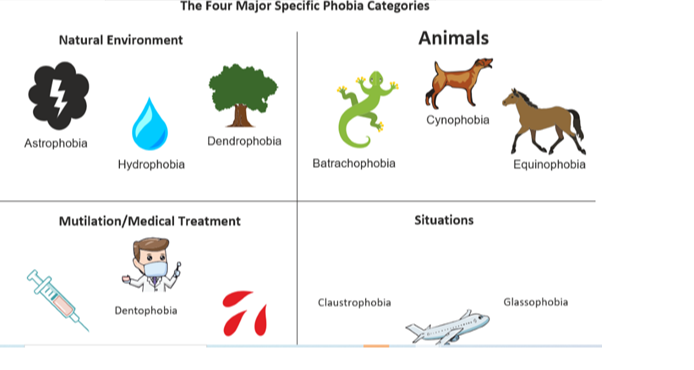What is a Phobia? Causes, Symptoms and Types of Phobias

A phobia is an unreasonable and extreme fear of an item or scenario. In most situations, phobia includes a feeling of damage. For example, those affected by agoraphobia fear being stuck in an unavoidable place or circumstance.
In other words, we can say that a phobia is a frustrating and unreasonable fear of an object or situation that presents a little real risk but creates stress and anxiety. Most individuals feel anxiety when they have a conversation or take a test; a phobia is long-lasting, causes extreme accurate and mental results, and can impact your ability to operate normally at work or in public configurations.
Common Phobias
A phobia is an extreme fear of something that presents little or no actual risk.
Common phobias and fears include:
- Closed-in places
- Heights
- Driving
- Flying bugs
- Snakes, and
- Small needles
Various types of phobias exist there. Some individuals have fear about large, open areas, while others cannot accept certain public circumstances. And still, others have a specific kind of phobia, such as a phobia of snakes, spiders, flying, lifts, or traveling.
The experience is so annoying that you may take extraordinary measures to prevent it — inconveniencing yourself or even modifying your way of life. If you worry about heights, you might drive an extra kilometer to avoid a high link.
However, we can create phobias of almost anything. Most fears generate in child age, but they may also develop in adults. Almost everyone has an unreasonable phobia—for example, your yearly dental check-up. For most individuals, these phobias are minimal.
But, when anxieties become so severe that they cause tremendous stress and intervene with your usual way of life, they’re called phobias. The good news is that phobias can be handled and treated. Self-help techniques and treatment can help you get over your worries and start living the way of life you want.
Phobia Symptoms
Phobic signs can happen through contact with the fear item or scenario, or sometimes simply considering the terrifying object or things can cause a response. Typical signs associated with phobia include:
Physical symptoms of a phobia:
- Breathlessness
- Racing heart beating
- tightness in the chest or pain in the chest
- shaking or trembling
- Feeling light
- A running stomach
- Hot or cold flashes
- prickling sensations
- Sweating
Emotional symptoms of a phobia:
- A feeling of stress or panic
- Feeling an extreme need to escape
- Feeling separated from yourself
- A feeling of losing control of yourself and going insane
- Feeling like you’re going to die
Types of Phobias
There are three main types of phobias, include
- Simple Phobia (fear of an object or things)
- Social Phobia (fear of public)
- Agoraphobia (fear of situations)
How to Overcome Phobia
If you have a phobia, you probably understand that your fear is not reasonable, yet you still can’t manage your emotions. Just thinking about the horrifying situation may make you nervous. And when you’re exposed to the thing or object you fear, the fear is automated and frustrating. Not all phobias need therapy. But if a phobia impacts your everyday life, several treatments are available that can help you get over your worries often wholly.
Understanding your phobia is the first step to conquering it. It’s important to know that phobias are typical. Having a phobia does not mean you’re insane! It also helps to know that phobias are highly curable. You can get over your stress and worry, no matter how out of management it seems.
Trending Health Topics
- ADHD
- Allergies
- Arthritis
- Bipolar Disorder
- Bunions
- Car Accidents
- Chron's Disease
- Common Cold
- COPD
- Depression
- Dry Skin
- Dry throat
- Eczema
- Fungal Infection
- GERD
- HIV/AIDS
- Hypertension
- Irritable Bowel Syndrome (IBS)
- Multiple Sclerosis
- Osteoarthritis
- Psoriasis
- Rheumatoid Arthritis
- Skin Disorders
- strep throat
- Type 2 Diabetes
- Uncategorized